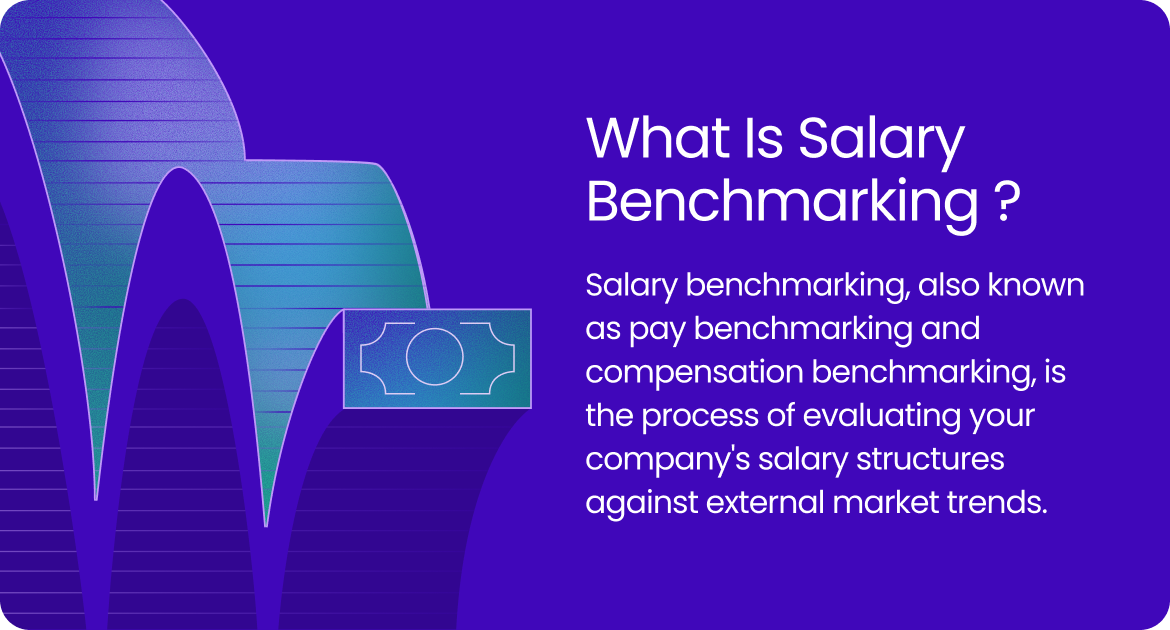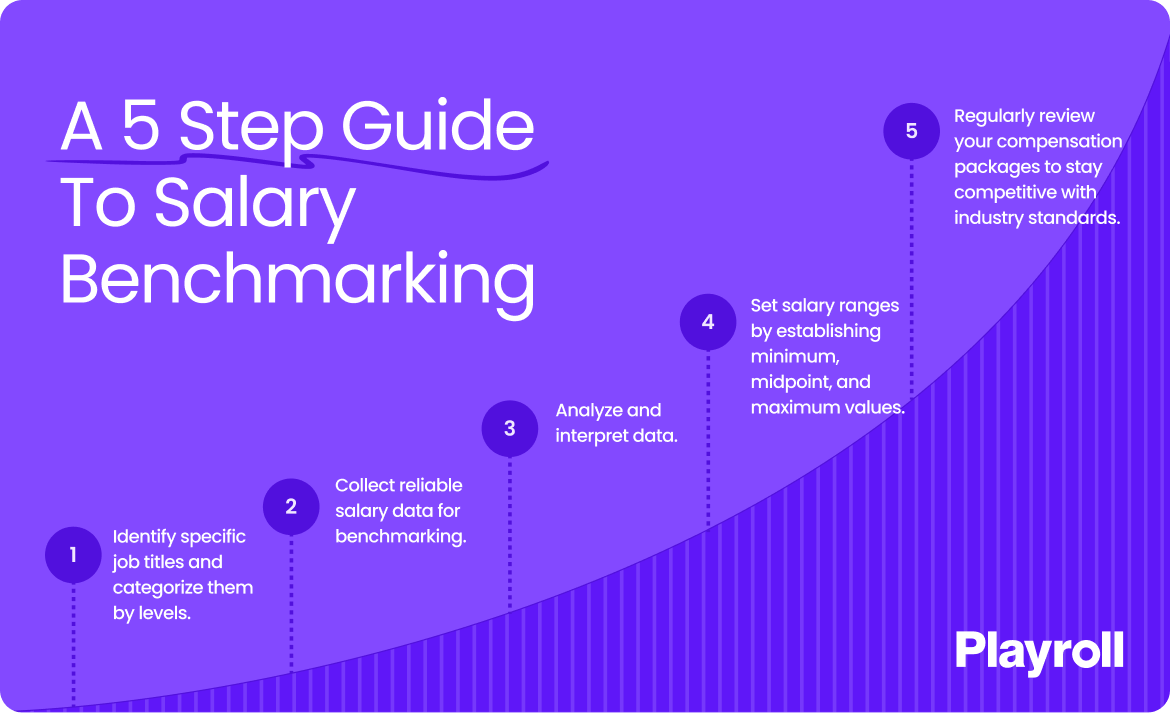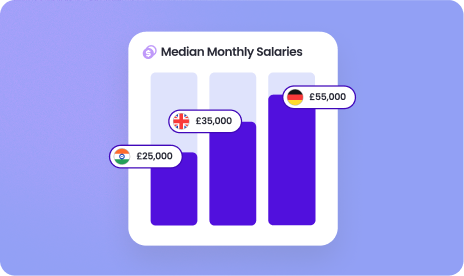How do you know if your compensation package is good enough to help you stand out in a crowded job market? What you offer prospective employees and existing employees could be the difference between hiring the best talent and losing out to your competitors. The answer: regularly benchmark your salaries. Salary benchmarking is the exercise you undertake to evaluate whether you’re offering enticing packages that will attract and retain top talent
Take, for example, hiring a software developer. After doing salary benchmarking, you discover that the average pay for a mid-level software developer (with 4-6 years of experience) is around $96,000 per year. If your offer is only $70,000, it’s more than likely the candidate will reject the offer. A more competitive offer not only helps you attract skilled candidates, but it also shows your team that they’re valued and fairly compensated – important for both retention and culture building.
With that in mind, let’s dig into the detail of how salary benchmarking can give you the upper hand in the employee compensation game.

Why Is Salary Benchmarking Important For Competitive Hiring?
In today’s fast-paced, global job market, salary benchmarking has become a key competitive advantage. With so much information readily available online and a number of free tools, it’s easier than ever to benchmark your salary offering quickly and effectively.
Keep your compensation packages aligned with market standards, and you’ll see the positive impact ripple through every aspect of your business.
Here’s a more granular look into the benefits of salary benchmarking:
1. Fair Pay
One of the core benefits of salary benchmarking is ensuring fair and equitable compensation. It helps you align your employees' salaries with their job title or role, experience, education levels, and industry standards. Being transparent with your employees will also help to build trust, boost morale, and signal that you value what they do.
When that LinkedIn in-mail comes through with a new job offer, you want to make your employees think twice.
2. Talent Retention
Competitive salaries are key, not only to attracting top talent but also to keeping your best people around. You need to make sure that your pay isn’t just competitive, but also compelling.
This is especially critical in the tech sector, where turnover rates are expected to hit 20% -25% in 2025. With the rapid pace of technological change and a constant need for upskilling, niche skills professionals like software engineers, data scientists, and cybersecurity experts are in high demand. Add the allure of innovative startup projects to the mix, and salary benchmarking becomes essential to keeping your team engaged and loyal in such a competitive industry.
3. Compliance
Salary benchmarking has taken on a whole new level of importance, particularly with global regulations becoming stricter and there being a greater emphasis placed on transparency. Take for example the EU Pay Transparency Directive, which now requires companies to disclose detailed pay information.
This makes it even more crucial to ensure your pay structures are aligned with local labor laws and meet these evolving compliance standards.
4. Informed Company Strategy
Salary benchmarking helps shape your company strategy by providing data that ensures your compensation plan is aligned with both your business goals and the competitive landscape.
- When expanding into new markets, benchmarking helps you understand local pay standards, so you can adjust salaries to attract talent without overspending.
- If you're scaling your team, it helps your compensation strategy evolve as your workforce grows, matching the needs of new roles or departments.
- During a restructure, benchmarking helps identify any pay gaps or adjustments needed to realign your compensation with your new direction.
5. Productivity Gains
There’s quite an obvious link between how much an employee is paid and how productive they are. The more fairly someone is paid, the better their living standards, the happier they are, the more likely they are to show up to work ready to do the best possible job they can.
Offering competitive pay not only reduces turnover but also builds a culture where employees feel valued, leading to higher engagement and job satisfaction. This creates a ripple effect, where employees are more productive, collaborative, and committed to driving better business outcomes.
6. Improving Company Growth and Performance
Salary benchmarking plays a pivotal role in aligning compensation with the broader market, which can have a significant impact on your company’s overall performance.
As employee satisfaction rises and retention rates improve, you see a positive ripple effect. Companies experience better operational efficiency, reduced hiring costs, and increased profitability. Benchmarking also helps you stay adaptable and responsive to changes in industry compensation trends.
How to Conduct Salary Benchmarking
Benchmarking salaries and payroll boils down to more than just comparing numbers, there are a couple of simple steps in the compensation benchmarking process that you’ll need to undertake to get the right results.
- Identify which roles need to be evaluated before the rest
- Collect industry data from reliable sources
- Analyze and interpret the relevant data
- Set your salary ranges accordingly
- Audit them regularly so that you’re always on par with current trends

Here’s a simple guide that takes you through each of these steps in detail:
1. Identify Roles
The first step in salary benchmarking is figuring out which roles in your organization need to be compared to market data. You don’t need to benchmark every position.Start by identifying the most critical roles – those that are either key to your business or have a high turnover rate. Once you’ve got your targets, break them down into categories, like junior, mid-level, or senior positions.
For example, a junior software developer may focus on coding tasks, while a senior developer will have more responsibilities, like managing teams or leading projects. Understanding the scope of each role will help you gather the right salary data to match your organization’s needs.
2. Gather Market Data
Once you’ve pinpointed the roles, it’s time to gather your data. You want to make sure you’re pulling from reliable sources – such as industry reports, government databases, compensation surveys, or even salary benchmarking software that pulls real-time data from job boards and recruiting platforms.
With a global workforce becoming the norm, it’s important to remember that pay for local and remote roles can differ significantly. For example, a role based in a high-cost city like London will likely need to be compensated more generously than one in a lower-cost area, like Eastern Europe. For remote roles, take both global and region-specific data into account.
And remember, 2025 has seen major shifts in salary trends, especially in industries like tech, healthcare, and finance – so make sure you’re using up-to-date data. Outdated information could lead to benchmarks that no longer reflect current market demands.
3. Analyze and Interpret Data
Once you’ve gathered the data, it’s time to dive in and make sense of it. Start by looking at the salary ranges for each role – this means the minimum, median, and maximum salaries. But don’t just focus on the numbers, take the location, industry, job level variations, and things like mandatory and voluntary benefits into account as well.
This is also the time to align the data with your company’s budget and goals. If your focus is on attracting and retaining top talent, you might want to lean toward the upper end of the salary range. If you’re more focused on cost efficiency, you might aim for the median and complement it with other benefits.
4. Set Salary Ranges
Now that you’ve got your data, it’s time to use it to set clear salary ranges for each role. These should include a minimum, midpoint, and maximum salary to give you flexibility when hiring, promoting, or offering performance-based raises.
Your ranges need to be both competitive and fair. They should reflect market standards while ensuring pay equity across similar roles within your company. For example, employees in the same role shouldn’t be drastically paid differently unless justified by factors like tenure or performance. Also, ensure that your ranges are scalable so you can adjust them as the market evolves.
5. Monitor Regularly
Salary benchmarking isn’t a one-time thing – it’s a process that needs to be monitored regularly. Market trends shift, and what was competitive last year or even last month, may not be competitive in the future. By reviewing your salary data every 6 to 12 months, you can stay ahead of the curve and keep your compensation attractive.
Keep an eye on emerging trends in your industry (like the rise of remote work or shifts in key talent pools) and adjust your pay structures as needed. Regularly checking in on the market allows you to proactively adapt and stay competitive.
Applying Benchmarking Results to Your Pay Structure
Benchmarking salary data will give your company the insights they need to build competitive, equitable pay structures that attract and retain talent. Here’s how your business can use these insights effectively:
Adjust Salaries for Competitiveness and Retention
With benchmarking data, you can match your salaries with current market trends. If a role in your company is paid lower than others in the industry, it’s time to make adjustments. For example, if your marketing team is being paid 10-15% less than the market average, increasing their pay can help keep them from jumping ship. Improve Compensation Packages
Benchmarking also includes bonuses, benefits, and perks. Take a look at how your benefits compare to competitors. Are you offering enough flexibility, a wellness program, or maybe retirement options? Candidates today are looking for strong benefits packages that add value to their lives beyond the office walls.
Refine Hiring Strategies
Benchmarking insights help you adjust your hiring approach by highlighting areas where higher pay might be needed to attract top talent. For example, if you notice that certain niche skills are underpaid compared to the market, you can adjust your job offers to stay competitive. It also helps when hiring remotely, particularly when you’re hiring globally where pay expectations differ by region.
Challenges in the Benchmarking Process and How to Overcome Them
Salary benchmarking can be a powerful tool, but it comes with its own set of challenges. Here are some of the most common obstacles and a couple of ways you can address them:
Data Reliability and Variability
One of the main challenges in salary benchmarking is keeping your data accurate and consistent. Differences in data sources, geographic regions, industries, and data collection timelines create several variations in the data that you’ll have to take into account.
Add variables like market fluctuations, shifts in job demand or inflation and your data can quickly become outdated. To overcome this, you should ideally pull data from a mix of reputable sources. This'll help to paint a more reliable and balanced picture of the market.
Handling Pay Equity and Compliance
Ensuring fair pay and staying compliant with regulations can get really challenging, especially when it comes to tackling pay gaps and navigating local laws. Disparities in pay or outdated benchmarks can lead to frustration, mistrust, and even costly legal tangles. Your company needs to make sure you’re following equal pay laws and addressing any systemic pay issues to avoid penalties and protect your reputation.
The good news is, salary benchmarking can help you identify and close those gaps, making sure your pay is fair and consistent across the board. That said, this takes time and effort that your team doesn’t necessarily have capacity for. Outsourcing the whole process to an Employer of Record can lighten the load. With a dedicated support team and payroll, benefits and compliance handled for you, you’ll easily stay aligned with industry standards.
7 Tools to Benchmark Salaries and Stay Competitive
Finding the right tools to help you accurately benchmark your salaries can be overwhelming, there are a lot of them out there! To make things easier, we’ve rounded up 7 free tools to help you and your team out.
1. Playroll: Perfect For Companies With Global Reach
Playroll is an excellent tool for companies operating globally, as it combines real-time data from trusted sources to provide salary benchmarking that's easy to access and understand. Plus it’s completely free! It allows you to benchmark salaries based on role, location, and industry, plus it adjusts for cost-of-living changes and evolving remote work trends. This makes it a solid choice for businesses with remote teams spread across various regions.
- Pros: Accurate, localized data; ideal for remote and distributed teams; intuitive interface.
- Cons: Data for niche roles might be more limited.
2. PayScale: The Largest Dataset
PayScale is one of the most widely used salary benchmarking tools, offering in-depth insights into market trends and pay equity across various industries. It’s a comprehensive resource that helps businesses understand where they stand in relation to competitors when it comes to compensation.
- Pros: Comprehensive dataset; strong focus on pay equity and employee engagement.
- Cons: Market data updates may lag, impacting real-time decision-making.
3. Mercer: Great For Detailed Insights
Mercer is a powerhouse in the world of compensation benchmarking, known for its detailed compensation surveys and reports. It’s particularly valuable for larger organizations needing customized insights or companies dealing with complex compensation structures.
- Pros: Highly detailed, industry-specific data; tailored insights.
- Cons: Expensive and complex for smaller businesses.
4. Salary.com: Best For U.S. Companies
Salary.com provides a wide range of tools for managing pay structures, evaluating benefits, and ensuring that your company’s compensation aligns with the market. It’s a well-rounded platform for most businesses, offering both salary data and functionality for pay planning.
- Pros: Comprehensive functionality; user-friendly dashboard for pay range planning.
- Cons: While great for the U.S. market, it doesn’t offer as much global data compared to some other tools, limiting its use for international teams.
5. Willis Towers Watson (WTW): Great For Robust Analytics
WTW is known for its global salary surveys and total rewards benchmarking tools. This platform integrates detailed compensation data with benefits analysis, providing companies with a comprehensive understanding of both direct pay and indirect rewards.
- Pros: Excellent global coverage; integrated benefits analysis.
- Cons: Costly and less flexible for smaller businesses; limited self-service features.
6. Radford (Aon): Best For Tech & Life Sciences Industries
Radford, now part of Aon, specializes in technology and life sciences sectors, providing targeted salary surveys and benchmarking insights for these high-demand industries. If you’re hiring for roles in tech, biotech, or other specialized fields, Radford’s sector-specific expertise makes it a valuable resource.
- Pros: Sector-specific expertise; detailed data for high-demand industries.
- Cons: Narrow industry focus excludes broader market data.
7. Glassdoor: Quick, Simple, & Free
Although Glassdoor is primarily known as a job search platform, it also offers user-reported salary data, making it a basic but accessible tool for salary benchmarking. If you're looking for a quick, free look at what others in your industry are paying, Glassdoor can provide a broad view of salary trends.
- Pros: Free access; broad, general-market overview.
- Cons: Data reliability varies due to self-reporting.
Best Practices for Benchmarking Payroll and Salaries
Salary benchmarking is a crucial part of staying competitive and compliant, but also ethical in a fast-changing job market. Here are some best practices to help you stay on top of things and you pay structures are always up to scratch:
- Benchmark Annually: Do an annual review of your pay structures to make sure your salaries are still in line with market trends and inflation. With costs rising, keeping up to date is key.
- Use Multiple Data Sources: Don't rely on just one source – combine insights from different reputable platforms to get a well-rounded view of the market.
- Prioritize Pay Equity: Look at how your pay compares across similar roles, and make sure you're addressing any gaps, whether it’s gender-based or regional disparities.
- Consider Total Compensation: Salary is only part of the equation. Make sure to include benefits, bonuses, and perks in your benchmarking to meet employee expectations and stay competitive.
- Adjust for Market Changes: Keep your benchmarks fresh by adjusting for shifts in the market – like cost-of-living changes, especially for remote roles.
- Maintain Transparency: Be open about how you set your pay and benefits. When employees understand the reasoning behind pay decisions, it builds trust and satisfaction.
- Align with Organizational Goals: Ensure your salary benchmarks reflect your company’s long-term priorities – whether you're focusing on growth, retention, or attracting specific skill sets.
- Focus on Specific Roles and Levels: While it’s important to benchmark across the board, make sure you're prioritizing critical and hard-to-fill roles to stay competitive in those areas.
- Leverage Technology: Use tools to make the process of collecting and analyzing salary data faster and more accurate, freeing up time for bigger decisions.
- Review Regularly Beyond Annual Cycles: Don't just wait for annual reviews – check salaries periodically during market shifts to stay nimble and adjust when needed.
Compare local salaries worldwide and make confident, competitive offers with Playroll’s free salary benchmarking tool.
Benchmark Salaries
Global Salary Benchmarking FAQs

.png)
Organizations should conduct global salary benchmarking periodically, typically on an annual or biennial basis, to stay informed about market trends and ensure their compensation strategies remain competitive.

.png)
When selecting benchmarking data sources, organizations should consider factors such as the relevance of the data to their industry and geographic location, the credibility and reliability of the data provider, and the comprehensiveness of the salary data available.
.svg)
.svg)
.svg)
.svg)
.svg)





.svg)




.png)

.png)

.svg)



















.svg)